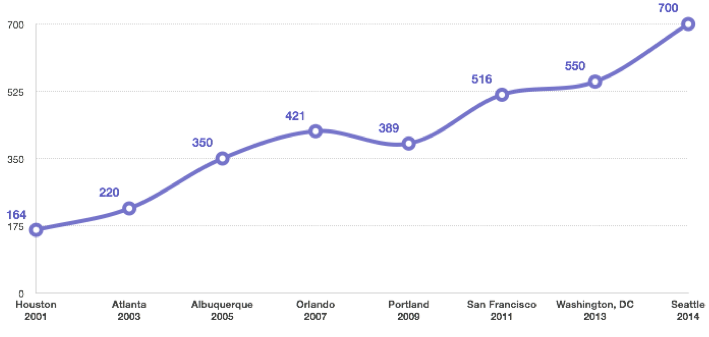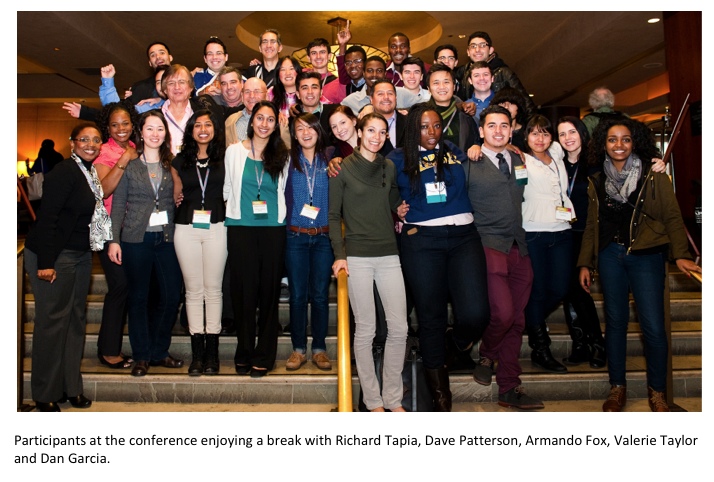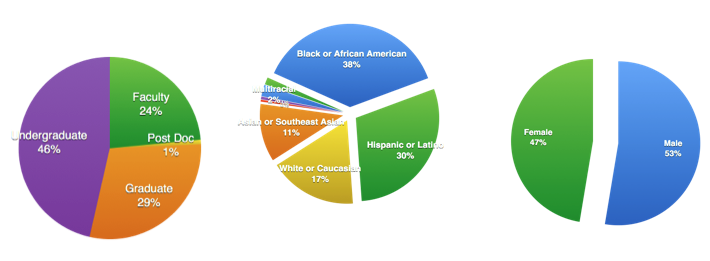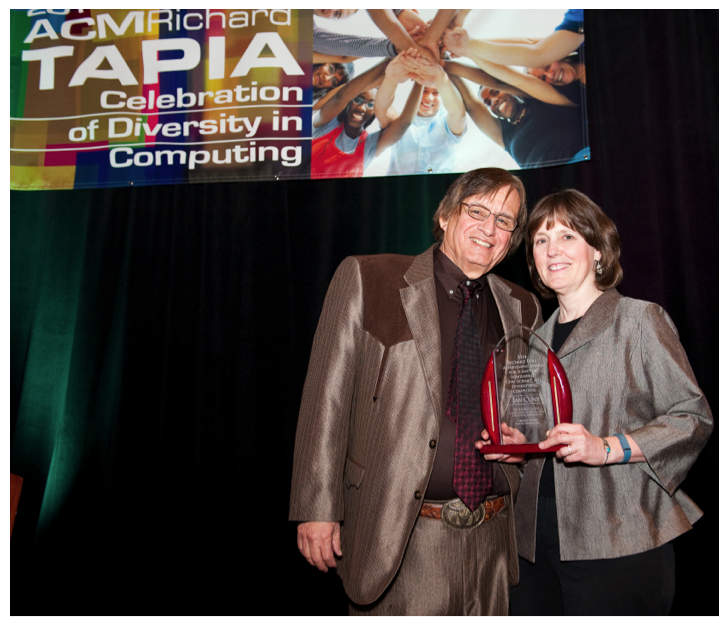2014 Tapia Celebration of Diversity in Computing Conference Breaks Attendance Records
The 2014 ACM Richard Tapia Celebration of Diversity in Computing Conference was held in Seattle, WA, February 5-8, 2014. The conference is the premier event for the Coalition to Diversity Computing (CDC) and presented by CMD-IT. The conference is now in its eighth year but it is now on a yearly cycle. The goal is to bring together a diverse group of technical leaders to lead discussions in the state-of-the art in computing and technology. The Tapia conference has a tradition of providing a supportive networking environment for under-represented groups of students and professionals, across the broad range of computing and information technology, from science to business to the arts to infrastructure.
For the third conference in a row, the Tapia Conference broke attendance records. We had 700 registered participants and closed registration early. As shown below, this continues a trend of steady growth for this conference and its attendees. We also had record numbers in applications for scholarships, company sponsors, and even undergraduate participation. Overall, it was a successful offering and part of a great trend for this group.
This conference is also quite possibly the most diverse conference in the ACM series. Making this year’s conference theme, “Strength of Diversity,” a reality, the conference had 47% female participation, 38% African-Americans, 30% Hispanics/Latinos, and 11% Asian/Southeast Asian. The strength of diversity at the conference was evidenced by the collegiality among these groups and the closeness of engagement and discussion that resulted. There was also a flurry of activity over social media (Twitter in particular, search for #Tapia2014) from the attendees at the conference, extending the reach and impact of this conference to other followers around the nation.
This year’s conference keynote speakers included Chieko Asakawa (Fellow, IBM Japan), Dan Garcia (University of California, Berkeley), Latanya Sweeny (Harvard University) and James McLurkin (Rice University). Kathryn McKinley (Microsoft) gave the Ken Kenney Distinguished Lecture and Marcus Mitchell (Google) was the banquet speaker. Jan Cuny (NSF) was awarded the Richard Tapia Award in recognition for her career long efforts to make computing more inclusive. Overall, the list of speaker and other participants reflected the diversity of our community, with excellent representation of both men and women, African-Americans, Hispanics, and people with disabilities.
Richard Tapia with Jan Cuny, the recipient of the 2014 Tapia Award.
In addition, conference attendees participated in panel discussions, workshops, student-based research posters, birds-of-a-feather (BoF) sessions, a code-a-thon, doctoral consortium and even a high school teacher’s workshop.
The 2014 conference counted with 47 supporters including our Platinum Supporters — NSF, TRUST, Microsoft, Georgia Tech, IAAMCS; our Gold supporters — Motorola Solutions Foundation, Google, XSEDE, Lawrence Livermore National Laboratory, the Department of Computer Science and Engineering at Texas A&M University, the Department of Computer Science at Virginia Tech, and the Department of Electrical Engineering and Computer Science at University of California at Berkeley; and many Silver and Bronze Supporters.
The Coalition to Diversify Computing (CDC) collaborated with The Computing Research Association Committee on Women in Computing (CRA-W) to provide professional development activities for Tapia Conference participants. The mentoring workshop was offered to undergraduate students, graduate students, and mid-career professionals to support the goals of the CDC and CRA-W, which include increasing the degree of success for women, people of color, and persons with disabilities who are pursuing careers in computing.
2014 marked the first year for the CRA-W/CDC workshops to be offered at Tapia. The workshop is designed to give student and professional conference attendee an opportunity to participate in hands-on training relating to career development. Speakers were professors, tech entrepreneurs, and research scientists representing industry, academia, and government, and participants were able to learn tips for how to be successful in computing at all levels. Speakers represented a host of organizations – more information about this year’s dynamic program and speakers can be found be found at http://tapiaconference.org/.
This year’s Conference General Chair was Annie Anton (Georgia Tech), and the Program Committee Chair was Manuel A. Pérez-Quiñones (Virginia Tech). The 2015 Tapia conference will be held in Boston, MA on February 18-21, 2015. The Conference General Chair is Charles Isbell (Georgia Tech) and the Program Committee Chair is Ron Metoyer (Oregon State University).
The Tapia conference is organized by the Coalition to Diversify Computing (CDC), sponsored by the Association for Computing Machinery (ACM), and presented by the Center for Minorities and People with Disabilities in Information Technology (CMD-IT). Join us next year in Boston!
About the Authors
Manuel A. Pérez-Quiñones is Associate Professor and Associate Department Head and Director for Graduate Studies in Computer Science at Virginia Tech. He received a BA and MS in Computer Science from Ball State University and a DSc from George Washington University. He worked at the Naval Research Lab and then joined academia with a position at the University of Puerto Rico-Mayaguez and has been at Virginia Tech since 2000. He is current co-chair of the CDC.
Jamika D. Burge is a Senior Scientist at Information Systems Worldwide, a technology, engineering, and research company providing high-end advanced technical, integration, engineering, and analysis solutions to the US Government and other organizations, where she is currently serving as a technical consultant and subject matter expert (SME) for Defense Advanced Research Projects Agency (DARPA). She earned her PhD in computer science and applications from Virginia Polytechnic Institute & State University (Virginia Tech), where she was an IBM Research Fellow and won an IBM Research Dissertation Fellowship. She currently co-chairs the Coalition to Diversify Computing (CDC).
Nancy M. Amato is Unocal Professor and Interim Department Head of the Department of Computer Science and Engineering at Texas A&M University where she co-directs the Parasol Lab. She received undergraduate degrees in Mathematical Sciences and Economics from Stanford University, and M.S. and Ph.D. degrees in Computer Science from UC Berkeley and the University of Illinois at Urbana-Champaign, respectively. She was co-Chair of the National Center for Women in Information Technology (NCWIT) Academic Alliance, currently serves on the CRA-W, CRA-E, and CDC committees, and is a Fellow of the American Association for the Advancement of Science (AAAS), a Fellow of the Institute of Electrical and Electronics Engineers (IEEE), a Fellow of the World Technology Network (WTN).











